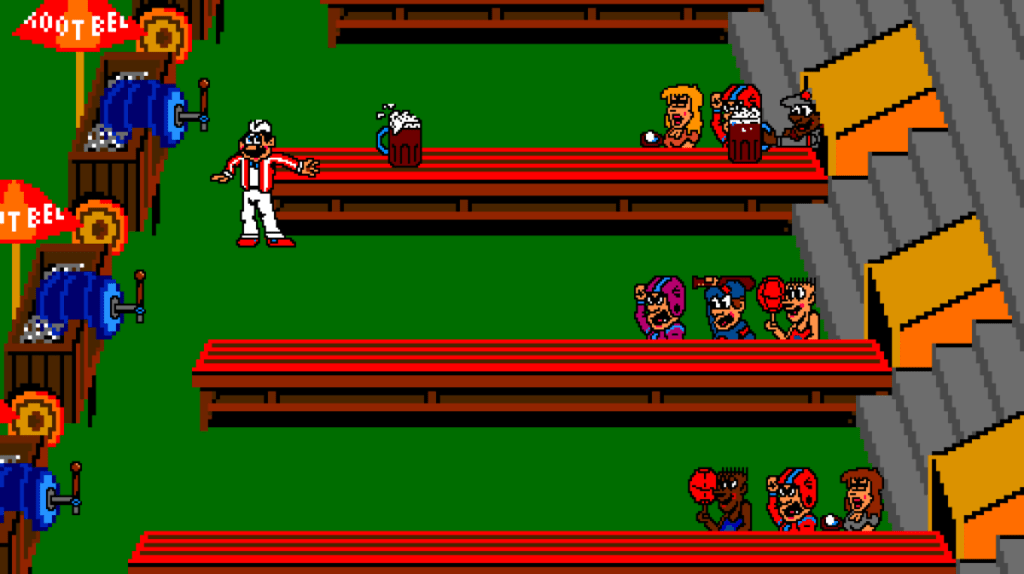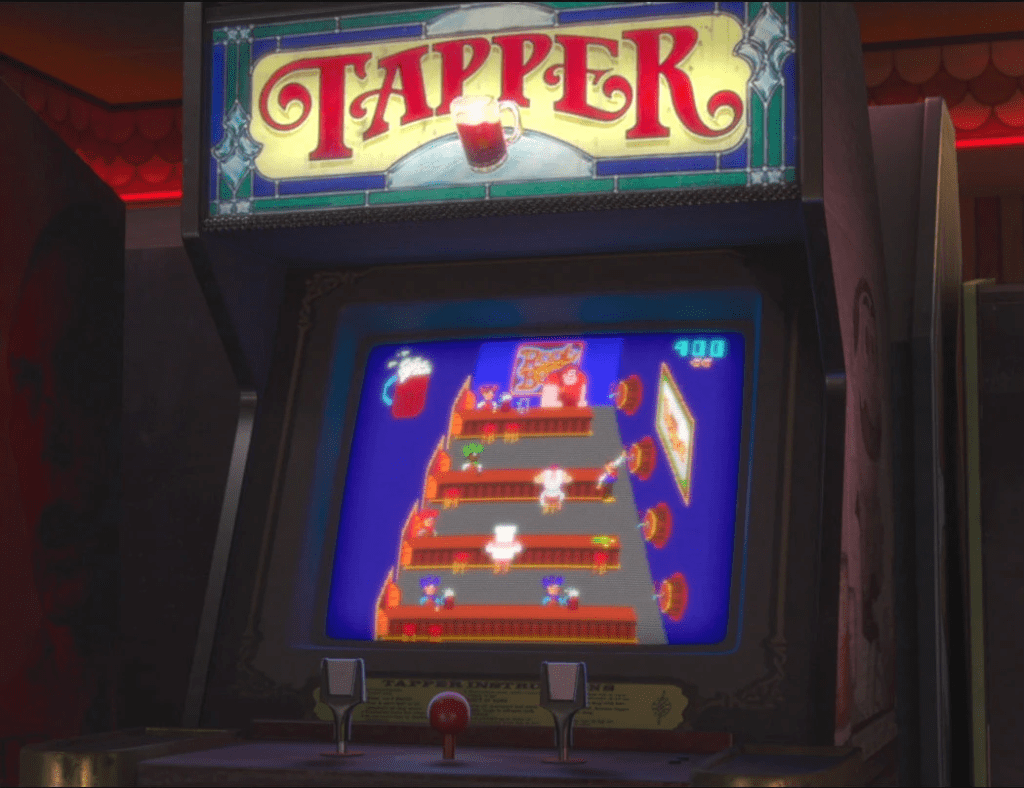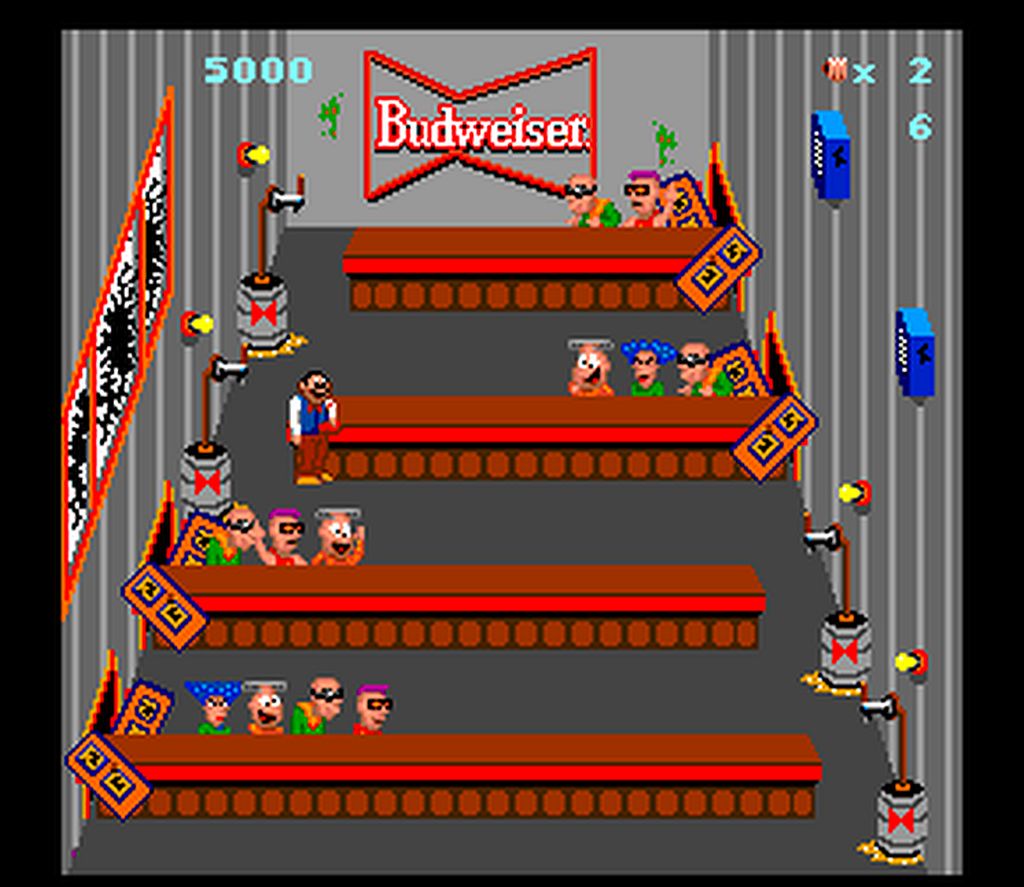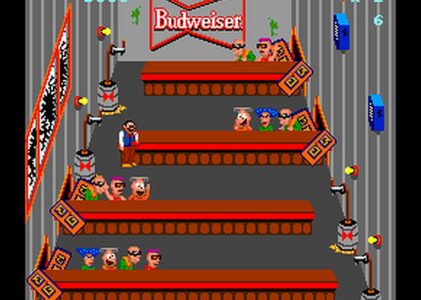In the realm of classic arcade games, few titles hold as much nostalgia and timeless appeal as Tapper. With its simple yet addictive gameplay, Tapper has etched itself into the annals of gaming history, captivating players of all ages since its release in the 1980s. In this exploration, we delve into the enduring charm of Tapper, its cultural impact, gameplay mechanics, and its journey through the annals of gaming history.
The Genesis of Tapper: From Bars to Arcades
Tapper, also known as “Root Beer Tapper,” was developed and released by Bally Midway in 1983. Designed by Marvin Glass and Associates, the game was originally conceived as “Beer Tapper” but was later modified to appeal to a wider audience by replacing alcoholic beverages with non-alcoholic ones like root beer. This alteration allowed the game to sidestep potential controversies while retaining its core gameplay mechanics.
Gameplay Mechanics: Pouring Success One Tap at a Time
At its heart, Tapper is a simple yet addictive arcade game that revolves around the concept of time management and coordination. Players take on the role of a bartender tasked with serving drinks to a rowdy crowd of thirsty patrons. The objective is to serve drinks to customers while simultaneously collecting empty mugs and tips, all while avoiding collisions with unruly patrons who slide drinks back if they reach the end of the bar.

The gameplay is fast-paced and requires quick reflexes, as players must juggle multiple tasks simultaneously to keep up with the increasing demands of the bar. As the levels progress, the difficulty ramps up, introducing faster-moving patrons and additional obstacles, challenging players to test their skills and endurance.
Cultural Impact: Tapping into the Zeitgeist of the 1980s
Tapper’s release coincided with the height of the arcade craze in the 1980s, cementing its place in pop culture history. The game’s setting in a bustling bar environment resonated with audiences, capturing the spirit of camaraderie and competition synonymous with arcade gaming during that era.
Moreover, Tapper’s family-friendly adaptation with root beer instead of beer allowed it to appeal to a broader audience, including younger players and families, further contributing to its widespread popularity. The game’s success spawned various adaptations and ports across different gaming platforms, ensuring its legacy endured beyond the arcade era.
Tapper’s Enduring Legacy: From Arcade Cabinets to Digital Platforms
Despite the evolution of gaming technology and shifting preferences in the gaming landscape, Tapper’s legacy endures, transcending generations and platforms. The game has been ported to various gaming consoles, mobile devices, and online platforms, ensuring its accessibility to contemporary audiences.
Moreover, Tapper’s influence can be felt in modern games that incorporate elements of time management and multitasking, paying homage to its innovative gameplay mechanics. The game’s iconic imagery and nostalgia-inducing soundtrack continue to evoke fond memories among veteran players while captivating new audiences with its timeless charm.
The Art of Tapper: A Visual and Auditory Delight
One of Tapper’s defining features is its vibrant and captivating visuals, which transport players into the lively atmosphere of a bustling bar. From the colorful character sprites to the intricately designed bar environment, every aspect of the game’s visuals is meticulously crafted to enhance the player’s immersion and enjoyment.

Furthermore, Tapper’s infectious soundtrack, composed by Scott Joplin, adds another layer of charm to the gaming experience, complementing the on-screen action with upbeat tunes that perfectly capture the game’s energetic pace and playful tone. Together, the visuals and music create a sensory delight that keeps players coming back for more, even decades after its initial release.
Tapping into Nostalgia: Rediscovering Tapper Today
In an era dominated by cutting-edge graphics and complex gameplay mechanics, Tapper serves as a refreshing reminder of the timeless appeal of classic arcade games. Its simple yet engaging gameplay, coupled with its nostalgic charm, continues to captivate players of all ages, transcending the boundaries of time and technology.
Whether revisiting the classic arcade cabinet or experiencing it on modern gaming platforms, Tapper remains a beloved classic that holds a special place in the hearts of gamers worldwide. As we raise a virtual toast to this iconic title, let us celebrate its enduring legacy and the joy it continues to bring to generations of players.
Tapping into Nostalgia: Exploring the Enduring Charm of Tapper
In the realm of classic arcade games, few titles hold as much nostalgia and timeless appeal as Tapper. With its simple yet addictive gameplay, Tapper has etched itself into the annals of gaming history, captivating players of all ages since its release in the 1980s. In this exploration, we delve into the enduring charm of Tapper, its cultural impact, gameplay mechanics, and its journey through the annals of gaming history.
The Genesis of Tapper: From Bars to Arcades
Tapper, also known as “Root Beer Tapper,” was developed and released by Bally Midway in 1983. Designed by Marvin Glass and Associates, the game was originally conceived as “Beer Tapper” but was later modified to appeal to a wider audience by replacing alcoholic beverages with non-alcoholic ones like root beer. This alteration allowed the game to sidestep potential controversies while retaining its core gameplay mechanics.
Gameplay Mechanics: Pouring Success One Tap at a Time
At its heart, Tapper is a simple yet addictive arcade game that revolves around the concept of time management and coordination. Players take on the role of a bartender tasked with serving drinks to a rowdy crowd of thirsty patrons. The objective is to serve drinks to customers while simultaneously collecting empty mugs and tips, all while avoiding collisions with unruly patrons who slide drinks back if they reach the end of the bar.
The gameplay is fast-paced and requires quick reflexes, as players must juggle multiple tasks simultaneously to keep up with the increasing demands of the bar. As the levels progress, the difficulty ramps up, introducing faster-moving patrons and additional obstacles, challenging players to test their skills and endurance.
Cultural Impact: Tapping into the Zeitgeist of the 1980s
Tapper’s release coincided with the height of the arcade craze in the 1980s, cementing its place in pop culture history. The game’s setting in a bustling bar environment resonated with audiences, capturing the spirit of camaraderie and competition synonymous with arcade gaming during that era.
Moreover, Tapper’s family-friendly adaptation with root beer instead of beer allowed it to appeal to a broader audience, including younger players and families, further contributing to its widespread popularity. The game’s success spawned various adaptations and ports across different gaming platforms, ensuring its legacy endured beyond the arcade era.
Tapper’s Enduring Legacy: From Arcade Cabinets to Digital Platforms
Despite the evolution of gaming technology and shifting preferences in the gaming landscape, Tapper’s legacy endures, transcending generations and platforms. The game has been ported to various gaming consoles, mobile devices, and online platforms, ensuring its accessibility to contemporary audiences.
Moreover, Tapper’s influence can be felt in modern games that incorporate elements of time management and multitasking, paying homage to its innovative gameplay mechanics. The game’s iconic imagery and nostalgia-inducing soundtrack continue to evoke fond memories among veteran players while captivating new audiences with its timeless charm.
The Art of Tapper: A Visual and Auditory Delight
One of Tapper’s defining features is its vibrant and captivating visuals, which transport players into the lively atmosphere of a bustling bar. From the colorful character sprites to the intricately designed bar environment, every aspect of the game’s visuals is meticulously crafted to enhance the player’s immersion and enjoyment.
Furthermore, Tapper’s infectious soundtrack, composed by Scott Joplin, adds another layer of charm to the gaming experience, complementing the on-screen action with upbeat tunes that perfectly capture the game’s energetic pace and playful tone. Together, the visuals and music create a sensory delight that keeps players coming back for more, even decades after its initial release.
Tapping into Nostalgia: Rediscovering Tapper Today
In an era dominated by cutting-edge graphics and complex gameplay mechanics, Tapper serves as a refreshing reminder of the timeless appeal of classic arcade games. Its simple yet engaging gameplay, coupled with its nostalgic charm, continues to captivate players of all ages, transcending the boundaries of time and technology.
Whether revisiting the classic arcade cabinet or experiencing it on modern gaming platforms, Tapper remains a beloved classic that holds a special place in the hearts of gamers worldwide. As we raise a virtual toast to this iconic title, let us celebrate its enduring legacy and the joy it continues to bring to generations of players.
Similar Games: Tapping into Familiar Territory
While Tapper holds a unique place in gaming history, several other games share similar gameplay mechanics and themes, offering players a chance to experience the thrill of bartending and time management. Here are a few notable titles:
1. Root Beer Tapper (1983)
- Description: This is the original version of Tapper before it was rebranded to appeal to a wider audience. Players serve root beer to patrons in a similar fashion to Tapper but with a different visual aesthetic.
- Link: Root Beer Tapper
2. Beer Run (1986)
- Description: In this arcade game, players control a bartender who must serve beers to patrons while avoiding obstacles and collecting tips. It shares similarities with Tapper but introduces unique gameplay elements.
- Link: Beer Run
3. The Simpsons: Tapped Out (2012)
- Description: While not directly related to bartending, this mobile game features similar mechanics of managing resources and satisfying customer demands. Players rebuild Springfield and complete tasks to earn rewards.
- Link: The Simpsons: Tapped Out













